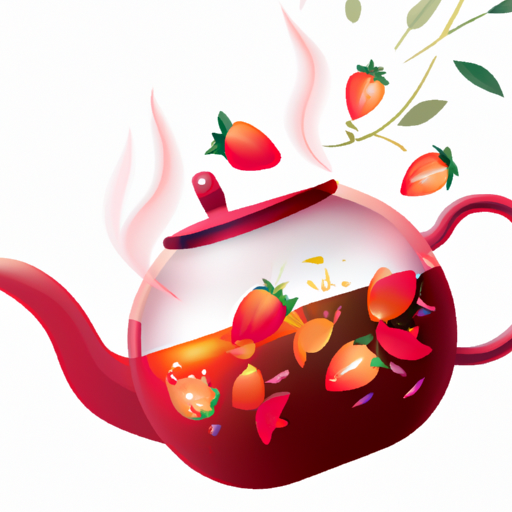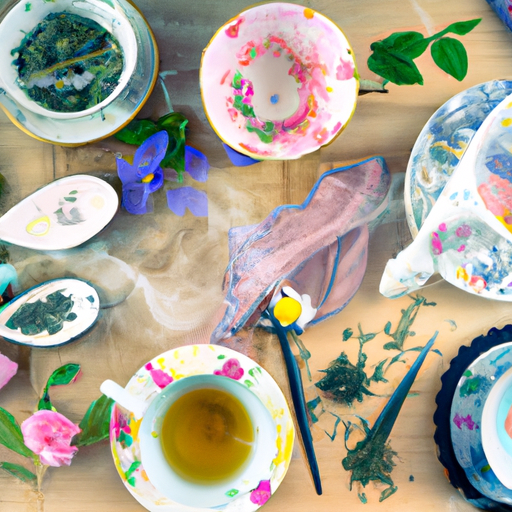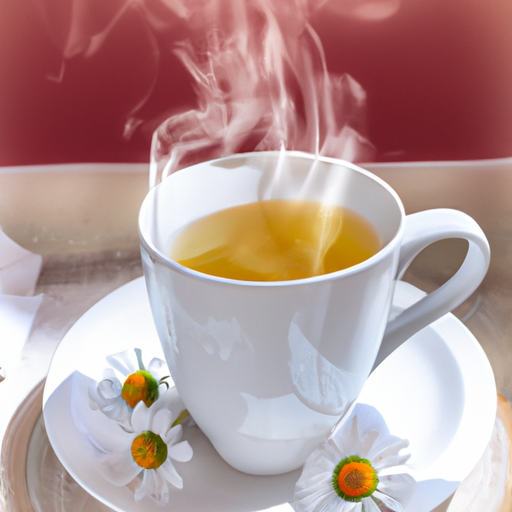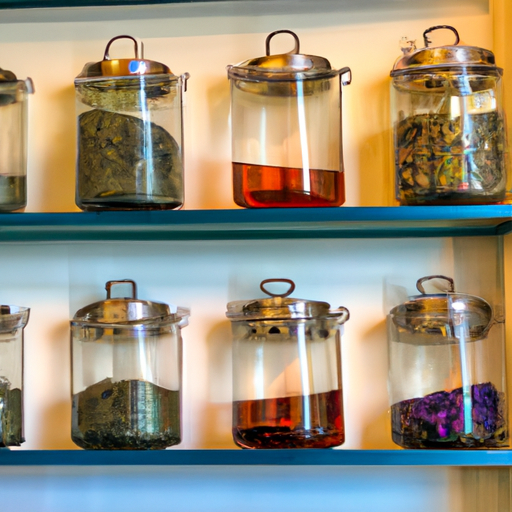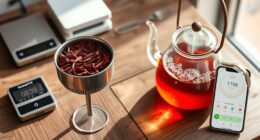Are you looking for a refreshing and flavorful beverage to enjoy on a warm summer day? Look no further than my simple and delicious recipe for homemade strawberry herbal tea.
In this article, I will guide you through the process of creating this delightful drink step by step.
First, we will gather our ingredients, including fresh strawberries and your favorite herbal tea blend.
Then, we will prepare the strawberries by washing and slicing them.
Next, we will brew the herbal tea and add the strawberries to infuse their sweet and tangy flavor.
To enhance the taste, we can sweeten the tea to our liking.
Finally, after letting the tea steep for a few minutes, we will strain it and serve it over ice for a refreshing treat.
Join me on this journey as we create a truly refreshing and satisfying strawberry herbal tea.
Key Takeaways
- Strawberry herbal tea can be enjoyed hot or chilled.
- To make hot tea, steep tea bags in hot water for a few minutes.
- To make a cold beverage, let the tea cool down and add ice cubes.
- Enhance the flavor by adding lemon or mint.
Gather Your Ingredients
Now that you’ve got your teapot and strainer ready, it’s time to gather all your ingredients for making the most refreshing strawberry herbal tea. Strawberry tea benefits are numerous, as strawberries are packed with antioxidants, vitamin C, and other nutrients that can boost your immune system and promote overall health.
When it comes to herbal teas, there are many different types to choose from, such as chamomile, peppermint, or hibiscus. For our strawberry herbal tea, you’ll need fresh strawberries, dried strawberry leaves or tea bags, honey or sugar to sweeten, and water. These ingredients will blend together perfectly to create a delightful strawberry-infused beverage.
Now, let’s move on to the next step and prepare the strawberries for brewing.
Prepare the Strawberries
First, start by grabbing those vibrant, ripe strawberries and get ready to experience a burst of sweet and refreshing flavors in every sip. To ensure the best taste, it’s crucial to select the right strawberries. Look for ones that are deep red in color, firm to the touch, and have a strong fragrance.
Once you have your strawberries, it’s time to give them a thorough wash. Place them in a colander and rinse them under cold running water, gently rubbing to remove any dirt or debris. After washing, pat them dry with a paper towel.
Now, it’s time to prepare the strawberries for brewing. Remove the green tops by either using a paring knife or simply pinching them off. Cut the strawberries into small, bite-sized pieces to release their flavor more effectively.
With your strawberries prepared, let’s move on to brewing the herbal tea, where we’ll create a delightful infusion of flavors.
Brew the Herbal Tea
To enhance the infusion process, it’s fascinating to learn that the temperature of the water plays a crucial role in extracting the full flavors and beneficial properties of the selected herbs. Different brewing techniques can be used to achieve the desired taste and effects. One popular method is steeping the herbal tea in hot water for 5-7 minutes. This allows the herbs to release their natural oils and flavors into the water. Another technique is called cold brewing, where the tea is steeped in cold water overnight, resulting in a smoother and less bitter flavor profile.
Benefits of drinking herbal tea are numerous. It can help boost the immune system, aid in digestion, promote relaxation, and provide antioxidants. Some herbs commonly used in herbal tea, such as chamomile and peppermint, have soothing properties that can help with stress and anxiety.
Once the herbal tea is brewed, it’s time to add the strawberries to the tea. This will infuse the tea with a delicious fruity flavor and add an extra nutritional boost.
Add the Strawberries to the Tea
Enhancing the already delightful infusion, the addition of juicy strawberries creates a tantalizing blend of flavors that dance on the palate. The strawberries not only add a burst of sweetness but also bring numerous health benefits to the table.
- Strawberries are packed with antioxidants that help fight free radicals and boost the immune system.
- They’re rich in vitamin C, which promotes collagen production and supports skin health.
- Strawberries are known to improve heart health by reducing cholesterol levels and preventing plaque buildup in the arteries.
When it comes to making strawberry herbal tea, you can also experiment with alternative fruit options such as raspberries, blueberries, or even peaches for a unique twist. These fruits not only add their own distinct flavors but also provide additional health benefits.
Transitioning to the next section about sweetening to taste, it’s important to find the perfect balance of sweetness to complement the flavors of the strawberries and herbal tea.
Sweeten to Taste
Indulge your taste buds with the perfect touch of sweetness that will ignite pure delight in every sip. Adjusting the sweetness of your strawberry herbal tea can be a fun and personal experience. By trying different sweeteners, you can find the perfect balance that suits your preferences. To help you visualize the options, here is a handy table:
| Sweetener | Description |
|---|---|
| Honey | Adds a subtle floral note to the tea |
| Sugar | Provides a classic, familiar sweetness |
| Stevia | Offers a calorie-free alternative |
| Agave nectar | Imparts a rich and natural sweetness |
Experimenting with these sweeteners will allow you to create a unique flavor profile that complements the strawberries and enhances the overall taste of the tea. Once you have achieved your desired level of sweetness, let the tea infuse to fully release its delightful flavors.
Let the Tea Infuse
Now that we’ve sweetened our strawberry herbal tea to taste, it’s time to let the tea infuse and unlock all its flavors and benefits.
Allowing the tea to steep is crucial in extracting the maximum flavor and health benefits from the herbs and strawberries. As the tea infuses, the warm water gently extracts the natural oils and compounds from the ingredients, resulting in a fragrant and flavorful beverage. The longer you let the tea steep, the stronger the flavors will be.
Additionally, herbal tea infusions offer numerous health benefits, including improved digestion, boosted immunity, and reduced inflammation. Don’t be afraid to experiment with different flavors in your herbal tea infusions, such as adding fresh mint leaves or a squeeze of lemon. These additions can elevate the taste profile and provide additional health benefits.
Now, let’s move on to the next step: strain and serve the aromatic strawberry herbal tea.
Strain and Serve
After allowing the tea to infuse, it’s time to strain and serve it, revealing the full potential of its flavors and benefits.
To strain the tea, you can use a fine-mesh sieve or a tea strainer. This ensures that no herb particles or tea leaves make it into your cup. Gently pour the infused tea through the strainer, allowing the clear liquid to pass through while capturing any solids. This straining technique guarantees a smooth and enjoyable drinking experience.
Once strained, you have various options for serving your strawberry herbal tea. You can enjoy it hot by pouring it into your favorite mug and savoring the comforting warmth. Alternatively, you can let it cool and serve it over ice for a refreshing iced tea. This versatility makes strawberry herbal tea a delightful choice for any occasion.
Now, let’s move on to the next section and discover how to fully enjoy your refreshing strawberry herbal tea.
Enjoy Your Refreshing Strawberry Herbal Tea
Sip on the refreshing goodness of your homemade strawberry herbal tea and let the fruity flavors transport you to a sunny summer day. Not only does this delightful tea taste amazing, but it also offers incredible benefits for your overall health.
Herbal tea is known for its numerous health benefits, and strawberry herbal tea is no exception. It’s packed with antioxidants that help boost your immune system and fight off harmful free radicals. Additionally, it can aid in digestion and promote weight loss.
When it comes to serving your strawberry herbal tea, there are several ways to enjoy it. You can serve it hot or chilled, depending on your preference and the weather. For a hot tea, simply steep the tea bags in hot water for a few minutes, and you’re ready to go. If you prefer a cold beverage, let the tea cool down and add some ice cubes. You can also enhance the flavor by adding a squeeze of lemon or a sprig of mint.
However you choose to serve it, your strawberry herbal tea is sure to be a refreshing and delicious treat.
Frequently Asked Questions
How long does it take for the tea to infuse?
Infusing strawberry herbal tea takes about 5-7 minutes, like a gentle summer breeze caressing your senses. To enhance its flavor, try steeping it with honey or adding a squeeze of lemon. Experiment with different brewing methods for a delightful experience.
Can I use frozen strawberries instead of fresh ones?
Yes, you can use frozen strawberries instead of fresh ones to make strawberry herbal tea. While fresh strawberries have more flavor and nutrients, using frozen strawberries is convenient and still provides a delicious taste.
What type of herbal tea is best for making strawberry herbal tea?
The best herbal teas for summer drinks are ones that burst with flavor and provide refreshing benefits. Adding strawberries to herbal tea not only enhances the taste but also boosts immunity and aids digestion.
Can I add milk or cream to my strawberry herbal tea?
Yes, you can add milk or cream to your strawberry herbal tea. It adds a creamy richness to the flavor. If you prefer a dairy-free option, you can try alternative sweeteners like honey or agave syrup.
Can I use honey instead of sugar to sweeten the tea?
Why settle for sugar when you can sweeten your strawberry herbal tea with the natural goodness of honey? Not only does it add a touch of sweetness, but honey also brings along its numerous health benefits.
Conclusion
As I take a sip of this delightful strawberry herbal tea, I’m reminded of the simplicity and joy that can come from creating something with your own hands.
The burst of flavor from the strawberries perfectly complements the herbal notes of the tea, creating a truly refreshing and satisfying drink. It’s amazing how a few simple ingredients can come together to create such a delightful beverage.
So why not treat yourself to a cup of this deliciousness and indulge in a moment of pure bliss?

